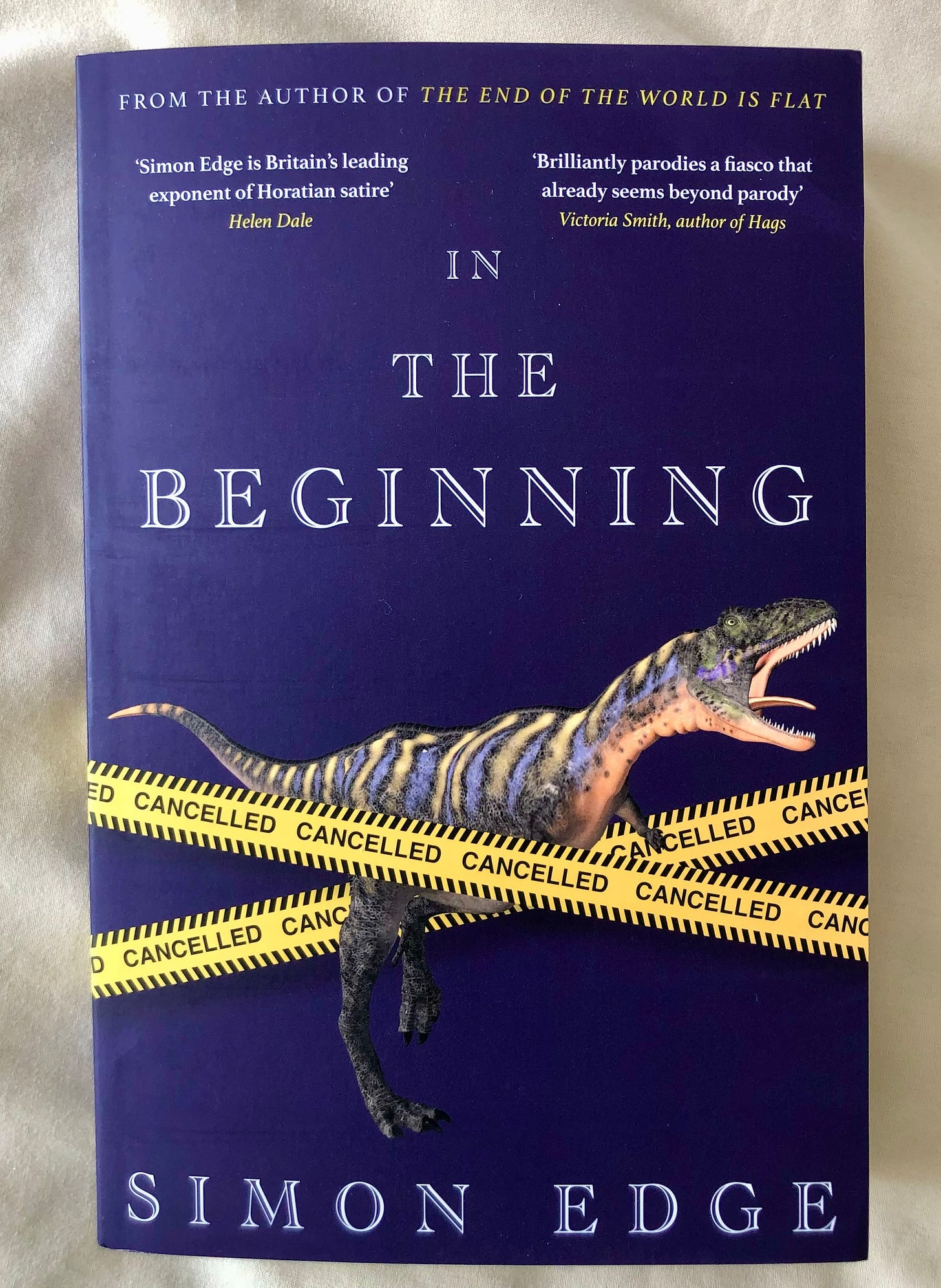In the Beginning
Simon Edge's second trans-lunacy comic novel deserves more love
The craft of literary book-reviewing has a number of unspoken norms, one of which is the following: if a critic provides a cover endorsement for a book, he can’t then review it for any mainstream publication (a newspaper or magazine, say).
This has happened to me with Simon Edge’s In the Beginning, his followup to The End of the World is Flat.
I reviewed The End of the World is Flat in two places—for a magazine, and then verbally, on TalkTV as part of a (then) weekly spot. The author clearly appreciated my encomiums, and invited me to provide a cover endorsement for In the Beginning, which I was delighted to do. Edge is a talented writer.
However—reviewing norms aside—there is nothing preventing me from writing a piece about In the Beginning on my own Substack. Both books are inexpensive and amusing stocking-stuffers worth acquiring in advance of the Christmas-New Year break. The End of the World is Flat was a bestseller. In the Beginning deserves to be.
Without introducing plot spoilers, it’s best to know in advance that Edge’s “method” when it comes to satirising the trans lunacy is to use an adjacent framing from elsewhere within Wokery and then apply it to the facts of an actual dispute. Perhaps because of his background working in the Middle East, he tends to hold “decolonisation” and the wider NGO-Aid-Development-Complex up to ridicule and contempt.
In The End of the World is Flat—instead of Stonewall’s attempt to tell us people can change sex and that female is a feeling—Edge introduces his readers to quackery via cartography. A small but beloved map-making charity, The Orange Peel Foundation—rather than winding itself up, its worldly tasks complete—is taken over by a Silicon Valley Big Tech-cum-Bond Villain billionaire who believes the world is flat. Its CEO—an experienced geographer unwilling to buy into any nonsense—is shoved arse-backwards out the door, her silence bought with a “colossal” sum of money. And, of course, a bit of lawyerly dark arts: the now commonplace non-disclosure agreement.
With In the Beginning, half-Palestinian, half-British development economist Tara Farrier returns from a seven-year stint in Yemen to work for the UK office of a US aid and development think-tank. Her role is to bring attention to that country’s civil war and attendant humanitarian crisis. All seems well until she loses her job after making a throwaway comment about the age of the Earth in a report that, among other things, explains Yemen’s unusual geography. In Edge’s fictitious world, voicing facts about geological ages and, later, evolution are held to be offensive to Native American communities who believe the Earth is 10,000 years old.
The plot then tracks the facts of the Forstater case closely, with some well-written courtroom scenes and (for once) an accurate depiction of the sorts of things barristers and solicitors do in the background of high profile trials. Both books are also romans a clef, so in addition to Farrier (Forstater), it’s amusing fun to work out who is standing in for whom as barbs fly. A certain shouty Labour MP who bursts a blood vessel on the floor of the Commons during a debate is not to be missed.
What Edge does to academic “decolonisation” theory is exquisite, however, partly because creationism has always been a closer analogy to the claims made by transactivists than flat-earthism or geocentrism, but mainly because the world and his wife now knows where decolonisation leads.
This does mean—in a post October 7th world—In the Beginning is less funny than it was when Edge wrote it. Events, dear boy and all that. However, you have to give him credit for his prescience. He depicts a world where the (allegedly) oppressed are allowed to behave appallingly on the basis of their (alleged) oppression, while anyone who demurs is cast out. In a process familiar to us from the treatment of black and brown Tory Cabinet ministers or dissenting minority academics like Tony Sewell or Remi Adekoya, Farrier rapidly becomes “the wrong sort of Palestinian” because she refuses to get with the programme.
As with The End of the World is Flat, Edge really shines when depicting Twitter spats. The book pages where these are laid out—properly formatted and appearing as they would on an iPhone—are inspired. Once again, too, he shows he likes his characters. This latter is important, because there’s long been a division in satire between its Horatian and Juvenalian forms. English literature and arts is traditionally given to Juvenalian bitterness: Hogarth and Swift eviscerate their targets. Edge, by contrast, resembles the Roman poet Horace, who indulges the people he writes about while nonetheless taking the piss out of them.
This quality helps him when depicting the other side in a fraught and angry debate. To that end, I suggest taking note of the character “Sorrel” whenever she appears. She is well-drawn and convincing.
In the Beginning comes highly recommended.



Bought on Amazon Canada. Thanks for this.
Thanks for my wife's Christmas gift.